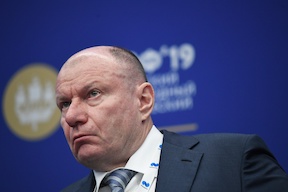Billionaire Vladimir Potanin, Russia’s richest man and one of the few tycoons to escape sanctions, tore into every aspect of his country’s retaliation against international penalties enacted over President Vladimir Putin’s invasion of Ukraine.
The biggest shareholder in MMC Norilsk Nickel PJSC warned that the tit-for-tat measures risked backfiring and cautioned against burning bridges with foreign companies that are exiting Russia under pressure.
In a broadside on Norilsk Nickel’s Telegram channel, Potanin teed off on the key elements of the government’s plans so far—from the threat of nationalization of foreign assets to restrictions on debt repayments abroad. He appealed instead for “calibrated, pragmatic” counter-moves from Russia rather than a response that would only come back to haunt the domestic economy.
“We have to look respectable and composed, and our efforts should be directed not at ‘slamming the door’ but at maintaining Russia’s economic position in markets that we’ve been mastering for so long,” he said.

Potanin’s comments posted late Thursday are the most public dissent yet from the ranks of Russia’s business elites that have come under withering pressure to break with Putin by way of asset freezes and travel bans imposed by governments in Europe and the U.S. since the invasion began Feb. 24.
There have been few public expressions of disaffection so far. Rare exceptions from the likes of Oleg Deripaska and Mikhail Fridman, who have both been sanctioned, have included calls for peace and remorse over bloodshed in Ukraine.
Privatization Mastermind
Potanin has not been subject to international sanctions and is among the few of Russia’s original oligarchs who remain active in business in the country. He is often referred to as the mastermind behind the Russian loans-for-shares program that resulted in the privatization of natural resource companies after the Soviet Union’s collapse. The father of seven has played hockey with Putin in the past with other notable Russian personalities. He became the co-owner of Norilsk Nickel in 1995 and has been chief executive officer since 2012.
Potanin, 61, has seen his fortune shrink by more than a quarter this year to $22.5 billion, according to the Bloomberg Billionaires Index, still enough to top the list of the wealthiest Russians.
He controls about 34% of Norilsk Nickel. The miner accounts for about 40% of global palladium output, as well as roughly 10% of the world’s platinum and refined nickel. It also produces 3% of cobalt supply.
Two weeks into Russia’s war in Ukraine, the country’s economy finds itself increasingly cut off from the outside world after multiple rounds of unprecedented sanctions that included a freeze on much of the central bank’s $643 billion in reserves.
In response, Russia has announced an export ban for more than 200 products and restricted foreign-exchange transactions with international investors that raised the risk of default on government debt. It’s also moved closer to seizing and even nationalizing foreign-owned companies that are leaving the market.
Potanin said Russia should cling to its export markets instead of abandoning them voluntarily and called for restrictions on servicing foreign debt to be lifted. By failing to make modest sovereign bond repayments, the country risks a cross-default on its entire external debt and could see creditors demand immediate repayment, he said.
“This fully applies to large public companies, so it’s necessary to make adjustments to the current norm,” Potanin said.
When it comes to the threat of confiscation of foreign property, Potanin likened such policies to the nationalization that followed the Russian Revolution more than a century ago. Instead of risking the mistrust of investors for decades to come, the government should ensure that international businesses will have an opportunity to return in the future, he argued.
A proposal by the Economy Ministry this week to bring in external managers to oversee foreign-owned companies is a “far more appropriate measure,” Potanin said. Putin approved this measure at a meeting with the government Thursday.
“In light of the economic restrictions directed against Russia, there may be an understandable desire to act symmetrically,” Potanin said. “But the example of Western countries shows the economies of these countries themselves suffer from the imposition of sanctions against Russia. We must be wiser and avoid a scenario where retaliatory sanctions hit us ourselves.”

Follow us on social media: